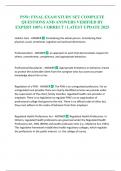PSW: FINAL EXAM STUDY SET COMPLETE
QUESTIONS AND ANSWERS VERIFIED BY
EXPERT 100% CORRECT | LATEST UPDATE 2025
Holistic Care - ANSWER Considering the whole person. Considering their
physical, social, emotional, cognitive and spiritual dimensions.
Professionalism - ANSWER an approach to work that demonstrates respect for
others, commitment, competence, and appropriate behaviors.
Professional Boundaries - ANSWER Appropriate limitations on behavior, meant
to protect the vulnerable client from the caregiver who has access to private
knowledge about him or her.
Regulation of a PSW - ANSWER The PSW is an unregulated profession. For an
unregulated care provider there are clearly identified services we provide under
the supervision of the client, family member, regulated health care provider or
employer. There is no legislation to regulate PSW's or an organization of
professional college that governs the role. There is no official code of ethics but
they must adhere to the codes of behavior from their employer.
Regulated Health Professions Act - ANSWER Regulated Health Professions. In
Ontario, regulated health professions are governed under the Regulated Health
Professions Act, 1991 (RHPA) and health profession Acts (i.e., Medicine Act, 1991).
This legislative framework establishes health regulatory colleges, which regulate
the professions in the public interest. i.e. the college of nurses.
,Role of the occupational therapist - ANSWER Focuses on rehabilitation;
teaches clients skills needed to perform ADLs; designs adaptive equipment for
ADLs
Role of the physical therapist - ANSWER Focuses on rehabilitation; assist clients
with musculo-skeletal impairments; focuses on restoring function and preventing
disability from illness or injury
Role of Registered Nurse (RN) - ANSWER assesses, makes nursing diagnoses,
plans, implements, and evaluates nursing care. Tends to clients with unstable
health conditions; provides direct client care, administers medications, supervises
support workers
Role of RPN Licenced practical nurse (LPN) - ANSWER a health care provider
licensed and regulated by the province or territory to carry out nursing techniques
and provide client care. Known as a registered practical nurse (RPN) in Ontario.
ALL RULES REGARDING DELEGATION - ANSWER Only regulated health care
providers like nurses have the authority (legal right) to perform certain tasks
because they have the knowledge, skill and training to perform them. They are
called controlled acts and are considered harmful if they are performed by
unqualified people. In some circumstances some acts will be delegated to you. In
order to do this, specific conditions called "exceptions" must be met for
delegation to be permitted. The nurse must feel confident the support worker
understands what the responsibilities are when performing the task, knowns
when and who to ask for assistance, and knowns when, how and whom to report
the outcome of the task.
Tasks that may be delegated to support workers must be routine ones with
predictable outcomes that require little supervision and can only be delegated for
stable clients.
,Delegation tasks may include: suctioning a permanent tracheotomy in and out
catherization; administering glucometers, dressings, tube feedings and
medication.
Only some nursing tasks can be delegated. Your employer's policies and
guidelines, your job description and provincial or territorial legislation determine
what tasks can be delegated to you.
Sometimes these rules vary between community and LTC.
In Ontario an RN, RPN and LPN can delegate.
A delegated task is not transferrable to another client. Just because you did it for
one person, does not mean you are able to perform the SAME task on another
client without training.
Before delegating tasks, the nurse must know the following: - ANSWER • What
tasks your province or territory allows support workers to perform.
• The tasks included in your job description.
• What you were taught in your training program.
• What skills you have learned and how they were evaluated.
• Your work experiences.
A nurse who delegates a task is required to: - ANSWER • Have the knowledge,
skill, and judgement to perform the task competently.
• Have the additional knowledge, skill and judgement to teach the task to others.
The delegating nurse is responsible for providing all necessary teaching, but not
everyone is able to teach others how to perform something. Good communication
skills and patience required.
• Accept responsibility for teaching the task to the support worker. The nurse
must first determine the risks and benefits of teaching the task and be able to
confidently predict its outcome.
, • Assess your performance. The nurse must determine if you're able to perform
the task correctly.
• Determine if the task that is taught can be performed for more than one client.
Each client is unique.
• Monitor you over time to ensure you remain able to perform the task correctly
and safely.
In the community the nurse may provide you with written instructions, predicted
outcome and what to record.
You can refuse a task to be delegated to you if: - ANSWER • you have concerns
about your ability to do the task
• it is beyond your scope of practice
• the client's condition changes
5 RIGHTS OF DELEGATION - ANSWER right task
right circumstance
right person
right direction/communication
right supervision/evaluation
The right task - ANSWER Can the task be delegated? Does the provincial
nursing act or health professions act allow the nurse to delegate the task? Is the
task in your job description? Have you been trained to do the task? A job
description should be available.
The right circumstances - ANSWER What are the client's physical, emotional,
social, spiritual and cognitive needs currently? Do you understand the purpose of




